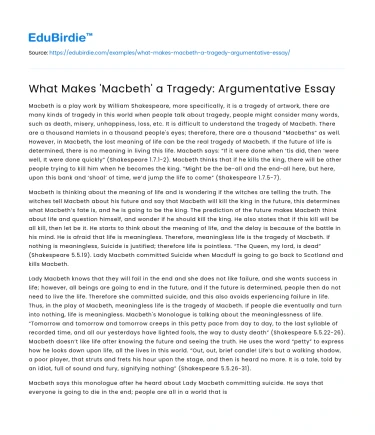Introduction
William Shakespeare's Macbeth stands as one of the most profound tragedies in literary history, drawing upon the quintessential elements of the tragic form. The play delves into the darker aspects of human nature, exploring themes such as unchecked ambition, moral corruption, and the inevitable descent into madness. At its core, a tragedy examines the downfall of the protagonist, whose inherent flaws are exacerbated by external forces, leading to a catastrophic denouement. In Macbeth, Shakespeare masterfully crafts a narrative that embodies the Aristotelian principles of tragedy, including the tragic hero, hamartia, and catharsis. This essay will argue that Macbeth fulfills the criteria of a tragedy through its exploration of the protagonist's tragic flaws, the inexorable fate that befalls him, and the profound emotional impact on the audience. By analyzing these elements, we can better understand how Shakespeare's use of dramatic structure and thematic depth solidifies Macbeth's status as a timeless tragedy.
The Tragic Hero and His Downfall
Central to the tragic nature of Macbeth is the character of Macbeth himself, who embodies the archetype of the tragic hero. According to Aristotle's definition, a tragic hero is a noble character with a fatal flaw, known as hamartia, which leads to their downfall. Macbeth's hamartia is his overwhelming ambition, which is ignited by the prophetic words of the three witches. As Macbeth muses, "I have no spur / To prick the sides of my intent, but only / Vaulting ambition, which o'erleaps itself" (Shakespeare, Act 1, Scene 7). This ambition, coupled with Lady Macbeth's manipulative encouragement, propels him towards regicide and a series of heinous acts. As Macbeth climbs the throne, his moral compass deteriorates, leading to paranoia and tyranny.
Save your time!
We can take care of your essay
- Proper editing and formatting
- Free revision, title page, and bibliography
- Flexible prices and money-back guarantee
Moreover, Macbeth's internal conflict and moral ambiguity heighten his tragic stature. His initial hesitation reflects a consciousness of the moral order, yet his actions betray a descent into chaos and ethical compromise. This internal struggle elicits both sympathy and revulsion from the audience, encapsulating the essence of a tragic hero. However, Macbeth's downfall is not solely of his own making; the supernatural elements, particularly the witches' prophecies, play a crucial role in shaping his destiny. As critic Harold Bloom notes, "Macbeth is a tragedy of the imagination, not of the will, as it is the witches' vision that haunts him to his end" (Bloom, 1998). Thus, Macbeth's journey is a complex interplay between personal agency and external influence, underscoring the tragic dimensions of his character.
Fate and the Inevitability of Tragedy
The theme of fate and the inescapability of destiny is a cornerstone of Macbeth's tragic framework. From the outset, the witches' prophecies set the stage for a predetermined path that Macbeth seems powerless to resist. Despite his attempts to alter his fate through violence and deceit, each action only serves to fulfill the witches' ominous predictions. The self-fulfilling nature of Macbeth's actions reflects the classical tragic motif of fate versus free will. As Macbeth laments, "Life's but a walking shadow, a poor player / That struts and frets his hour upon the stage / And then is heard no more" (Shakespeare, Act 5, Scene 5). This soliloquy captures Macbeth's realization of the futility of his pursuits and the inexorability of his demise.
In examining the inevitability of tragedy, it is essential to address the role of choice versus fate. While some might argue that Macbeth's downfall is purely a result of his own choices, the supernatural elements suggest a predetermined course of events. The witches, serving as agents of fate, introduce the concept of an inescapable destiny. Despite this, Macbeth's exercise of free will amplifies the tragic consequences. This duality of fate and choice is a critical aspect of the tragic narrative, allowing Shakespeare to explore the complexities of human agency within the confines of a predetermined fate.
Catharsis and Emotional Impact
Finally, the emotional resonance and cathartic effect of Macbeth solidify its classification as a tragedy. Aristotle posited that tragedy evokes feelings of pity and fear, leading to a cathartic experience for the audience. In Macbeth, these emotions are elicited through the protagonist's tragic arc and the resulting chaos that engulfs Scotland. The audience witnesses Macbeth's transformation from a valiant warrior to a tyrannical ruler, evoking pity for his lost potential and fear of unchecked ambition.
Furthermore, the play's exploration of guilt and its psychological ramifications contributes to its emotional depth. Lady Macbeth's descent into madness, marked by her compulsive handwashing and eventual suicide, underscores the destructive power of guilt. Her famous line, "Out, damned spot! Out, I say!" (Shakespeare, Act 5, Scene 1) symbolizes the indelible stain of their deeds. As scholar A.C. Bradley observes, "The tragic effect is heightened by the vivid realization of the mental and moral agony" (Bradley, 1904). This intense emotional engagement with the characters' suffering allows the audience to undergo a cathartic release, reinforcing the tragic nature of the play.
Conclusion
In conclusion, Shakespeare's Macbeth epitomizes the tragic genre through its intricate portrayal of a flawed hero, the inexorable pull of fate, and its profound emotional impact. The character of Macbeth embodies the tragic hero whose ambition leads to his downfall, while the interplay of fate and free will adds depth to the narrative. The play's emotional resonance, achieved through the themes of guilt and madness, ensures its enduring status as a tragedy. By adhering to the Aristotelian principles of tragedy, Macbeth continues to captivate audiences and scholars alike, offering a timeless exploration of the human condition. As we reflect on the tragic elements of Macbeth, we are reminded of the perils of ambition unchecked by moral restraint and the inevitable consequences of our choices.






 Stuck on your essay?
Stuck on your essay?

